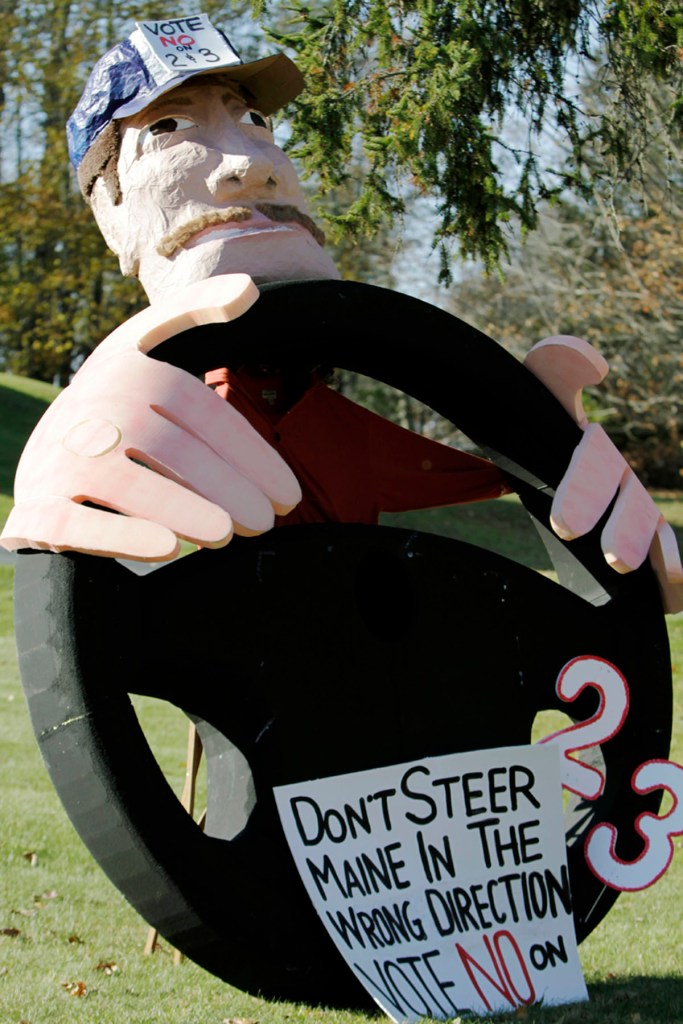PORTLAND — Maine voters on Tuesday rejected proposals for a casino in Lewiston and two racetracks with slot machines in southern and eastern Maine, keeping the number of approved gambling locations in the state at two.
Unofficial results showed two separate ballot initiatives failing. About 55 percent of voters opposed racinos in Biddeford and Calais, while 64 percent voted against a casino in Lewiston.
It came down to supporters of the two approved locations — a racino called Hollywood Slots in Bangor that’s been open for six years and a casino in the western Maine town of Oxford slated to open next spring — campaigning to keep competition out of the state, said Toby McGrath, the campaign manager for backers of the racino in Biddeford.
“I wouldn’t say that this was a moralistic vote,” McGrath said after conceding defeat. “It’s more of a fact that two gaming institutions opted to keep their monopolies here in Maine.”
Mainers also weren’t ready for three new gambling venues in one fell swoop, said Dennis Bailey, executive director of the Casinos No! anti-casino group.
“Going from two casinos to five was too much too soon for Mainers,” he said.
On the racinos question, Ocean Properties LLC, a Portsmouth, N.H., hotel and resort company, teamed up with the owner of Scarborough Downs racetrack in proposing to build a $120 million development with a racetrack, slot machines, hotel and small entertainment complex called Biddeford Downs, located near the Maine Turnpike in Biddeford. Backers said the project would have employed 800 construction workers and more than 500 full-time employees once it opened.
The referendum also would have allowed the Passamaquoddy Tribe to operate a racetrack with slot machines in eastern Maine. Tribal leaders didn’t develop a specific plan, but said the development would be in or near Calais, along the Canadian border. Passamaquoddy tribal leaders said their racino would have given a much-needed lift to the region’s ailing economy.
For the other question, Great Falls Recreation and Redevelopment LLC proposed spending more than $100 million to turn an abandoned textile mill into a casino with both slots and table games and a hotel and conference center. Developers said the project would have required 800 construction workers and 500 more workers once it opened.
Backers said the projects would stimulate Maine’s economy while generating revenues for the state and host municipalities.
Opponents argued that casinos are a drain on local economies and contribute to societal problems.
In Lewiston, 74-year-old Gene Tardif said he voted in favor of both proposals. Casinos, he said, would boost the economy and create jobs.
“I want casinos everywhere,” he said. “Why not?”
Retiree Ron Tanguay, 62, of Lewiston, voted against both casino questions, saying he doubted casinos would produce as many jobs as promised. He also worried they would suck hard-earned dollars out of people’s wallets. “There are enough poor people around who don’t need any more problems,” he said.
The pro-casino initiative had to overcome not only casino interests in Bangor and Oxford, but also Casinos No! campaigning against the referendums and Gov. Paul LePage stating last week that he didn’t think Maine was big enough to support five gambling facilities, said Larry Gilbert, the Lewiston mayor and spokesman for the group proposing the Lewiston casino.
“How could we fight against this?” Gilbert said.
The Passamaquoddy Tribe has been working for nearly 20 years to get a racino, said Chief Joseph Socobasin.
“We’ve been at this since 1992, and although we’ve been defeated tonight we aren’t giving up,” he said.
Supporters of gambling facilities in Lewiston and southern Maine also vowed they would continue to work for gambling facilities in their regions. Maine has a long history of harness racing, but the industry needs slot machines at horse tracks to compete for consumer dollars, said Ed MacColl, attorney for Scarborough Downs, which has been trying for more than a decade to get slot machines legalized at its track.
“Harness racing is not going down without a fight,” he said.
The referendums set off a spirited debate during the campaign, with casino backers outspending opponents by a 4-1 margin, according to campaign finance reports filed in late October.
The referendums also ignited a dialogue on whether Maine is in need of a statewide regulatory framework establishing things such as how many casinos should be allowed, where they should be and how they should share revenues with the state.
Supporters said market forces should determine whether Maine can handle up to five casinos and racinos, while others said the state doesn’t have the population base to support that many.
Copy the Story LinkSend questions/comments to the editors.



Success. Please wait for the page to reload. If the page does not reload within 5 seconds, please refresh the page.
Enter your email and password to access comments.
Hi, to comment on stories you must . This profile is in addition to your subscription and website login.
Already have a commenting profile? .
Invalid username/password.
Please check your email to confirm and complete your registration.
Only subscribers are eligible to post comments. Please subscribe or login first for digital access. Here’s why.
Use the form below to reset your password. When you've submitted your account email, we will send an email with a reset code.